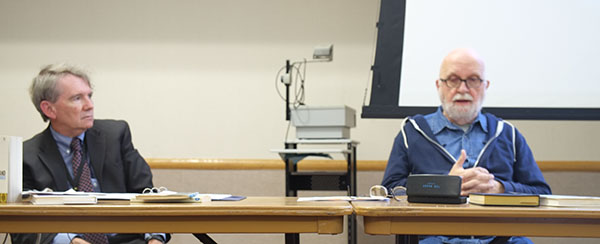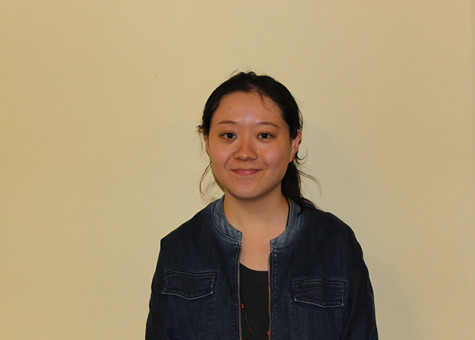Profs argue Ayn Rand

Pitt-Johnstown philosophy professor Martin Rice (left) debates with Duquesne University philosophy professor Fred Seddon (right) on Ayn Rand’s theories of ethics and art Friday in the Cambria Room.
October 22, 2015
The keynote session of the West Virginia Philosophical Society, a debate over Ayn Rand’s theories of ethics and art, drew about 50 attendees Friday in the Cambria Room Student Union.
Pitt-Johnstown philosophy professor Martin Rice was objecting against Rand’s theories, and Duquesne University’s philosophy professor Fred Seddon was supporting her theories.
Seddon said he saw Rand’s book “The Virtue of Selfishness” in a bookstore in 1964, and was engaged immediately.
He even named his daughter Ayn Rand, and the debate over Rand’s theory in the philosophical society started when his daughter was 8; she is now 48.
Rand, who was born in 1905 in Russia and died in 1982, wrote many novels, including “The Fountainhead,” “Atlas Shrugged” and non-fiction works, according to the Stanford Encyclopedia of Philosophy.
According to Rand’s “The Objective Ethics,” she concludes that ethics is not a subjective issue, but rather, it is objective, and based on pure reasons.
Rice projected a PowerPoint on a board display to show his understanding of Rand’s ethical theories.
On one slide, he wrote that there are three points to Rand’s ethical theory.
“(First), one’s life is one’s fundamental moral value; (secondly), acting rationally entails that one will act morally; (thirdly, there is) Rand’s normative ethical theory,” according to the PowerPoint.
Rice explained the third point.
“For any action A, if A rationally furthers the life or self-interest of a person P, then A is the morally right action for P to do; and the converse also holds (that if an action does not advance self-interest, then it is immoral.”
Rice argued that Rand’s definition is question-begging. According to Stanford’s Encyclopedia of Philosophy, begging the question refers to the fallacy that a conclusion has been assumed in the premise of an argument.
“It (Ethics) is a code of values to guide man’s choices and actions—the choices and actions that determine the purpose and the course of his life,” as Rand wrote of her definition of ethics.
Rice argued that Rand’s conclusion that ethics is objective is buried in this definition of ethics Rand gave.
Seddon responded that, although Rand did define ethics, ethical theory and ethics distinguish from each other.
He said because ethics is one of the main branches of philosophy, it is too broad a topic to be narrowed down into specific ethical theories.
Rice asked why it can be derived that, according to Rand, people need to be productive in a country that they don’t need to work to survive because of social welfare.
Seddon responded that for Rand, most people are immoral because they are usually blank out.
A question session began at 8:15, followed by another round of debate over Ayn Rand’s theories about photography and music.

